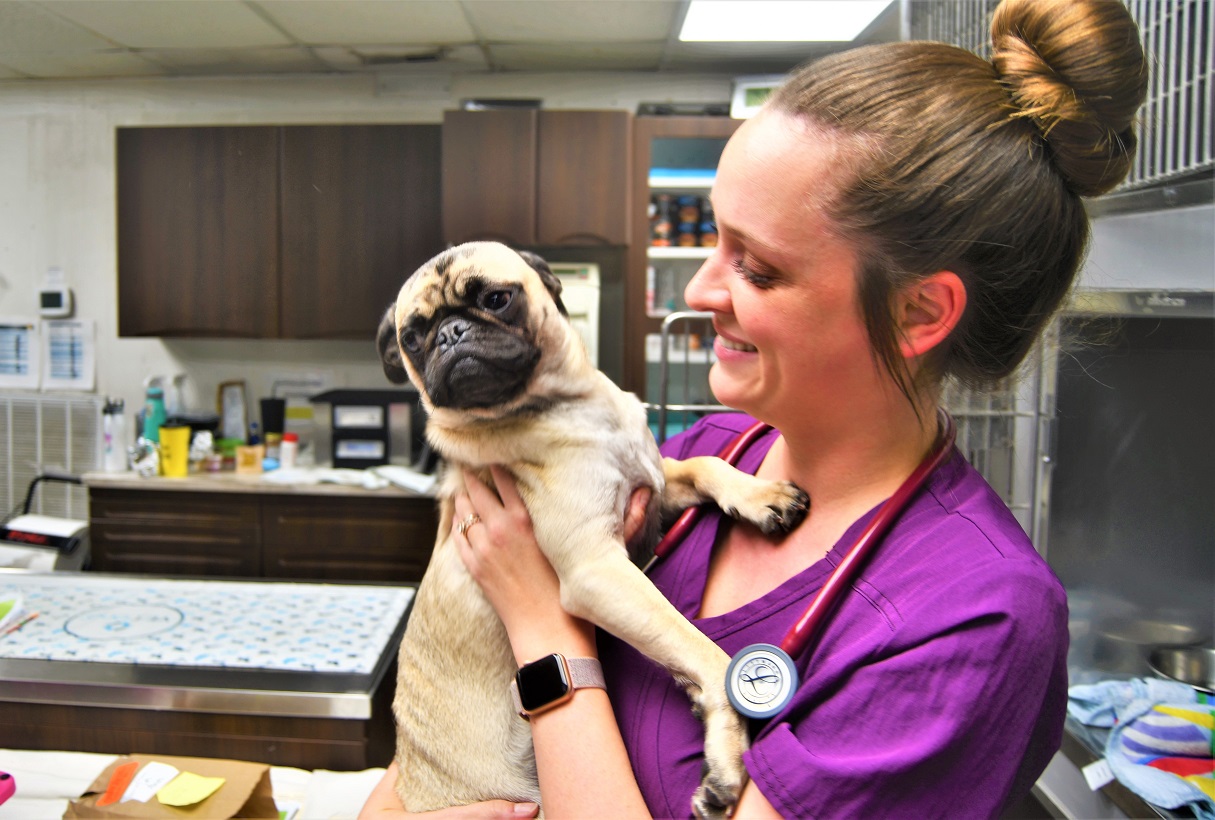
A national vet shortage is causing issues across the nation for pet owners and veterinarian clinics alike. According to the US Department of Agriculture, over 500 counties in 44 states had vet shortages in 2019 especially in rural areas.
Meredith Short, an associate veterinarian at Cross Creek Animal Hospital, graduated from NC State in 2017. Joining her husband, who is from the area, she began looking for a position in Fayetteville.
“In 2017, I applied at 14 clinics in Fayetteville and got interviews at seven of them. I was a baby vet, right out of school, but there was a shortage even then,” Short said.
Lack of Vet Schools
“When I was in undergrad at NC State, there were only 29 schools in the country, a little less than one per state. Out of those schools, they maybe take 100-160 applicants a year so that times 29 is still a low number,” Short said, “Three more schools have opened since 2012, but it still does not seem like enough.”
For the class of 2023 at NC State Veterinary Medicine school, more 1,200 applicants tried for 100 spots. Out of those 100 spots, 80 went to in-state applicants. Just like in medical schools, admission is very competitive, and an acceptance rate is between 10-15% according to most vet school prep agencies.
“NC State is affordable so it’s a highly sought school; however, they only take 100 veterinarian students a year, and out of 100, maybe 10 stayed in Raleigh and 20 are out of state. That leaves only 70 per year who are spreading out across the state,” Short said.
Rural challenges and specialization
The challenges for rural communities are even more so to attract qualified veterinarians.
“If we have 50 new vets, the likelihood that a vet is going to a rural community is not likely unless that person is from that area. There is a difference between large farm animals and small pets. When our building closes at 7, we go home,” Short said, “There is an emergency vet in Fayetteville for afterhours needs, but if you are a vet in in a rural area, you are on call. They may get called for a cow birthing a calf or other needs at all hours. It’s a different dynamic. People in rural areas may have to travel an hour or two (or more) to see the closest vet.”
Even with those staying in cities, graduates do not always apply for veterinary clinics that concentrate more generally with wellness and preventive care.
“A lot of new veterinary graduates will specialize too. They rotate in an internship similar to human doctors or like on Grey’s Anatomy for a year residency. I’m a general practitioner, but some will go on to be cardiologists, neurologists, anesthesiologists. They practice at specialty hospitals that we don’t have in Fayetteville. Blue Pearl is the closest to us with locations in Cary and in Raleigh. People in Fayetteville can also go to the vet school at NC State, if needed,” Short said.
Local Turnover
In Fayetteville, we are not seeing the shortage as much as other parts of the country, but we are seeing the turnover.
“When I started working at Cross Creek, I was the fifth vet, but because we are so military heavy here, I’m the only one out of my original staff four years later. No one leaves because they don’t love it. It’s all military related. Some only are able to work for a year,” Short said, “Out of 60 employees only five are not military including me. Most technicians and doctors are here because of the military. If we were in Charlotte or Raleigh, we might not see the turnover.”
Compassion Fatigue
Another factor that leads to the vet shortage is compassion fatigue and burn-out.
“We have the third highest suicide rate in our profession. The field we work in can be hard. We have pets we want to save and sometimes we can’t without huge expenses that are hard for their owners. We want to help so much more than we can sometimes. It’s called compassion fatigue.”
Compassion fatigue according to the American Veterinary Medical Association is a state of exhaustion resulting from prolonged exposure to compassion stress. This is especially hard in rural communities where they may only have one vet, who is on call 24/7 or in busier clinics where the caseload outweighs the available technicians and doctors. Veterinary clinics often offer training to identify warning signs to staff and encourage sleep, exercise, relaxation and teamwork.
“We work in a culture of euthanasia, which literally translates to a peaceful death. Not every day is cute, fluffy kittens, but we try to stay positive,” Short said, “Actually some days, there are quite a few cute kittens.”
Keeping positive
When Covid came about, Cross Creek Animal Hospital had to transition and adapt for mandated restrictions.
“With Covid, we’ve been offering curbside service since May 2020. We’ve got it down to where clients wait in the car, the technician gets their history and checks them in, takes their pet inside, the doctor evaluates the pet and then the pet is returned to their owner. We hope to fully open doors again soon so the owners can join us,” Short said with a smile and an enthusiastic nod for the days ahead.
Even as they have a challenging days, the pros outweigh the cons to Short, who first became interested in medicine during her senior year of high school and who has a passion for the furry little ones she serves and their owners.
“We want to provide the best service we can along with great medicine. The best thing about being a vet is that no day is the same,” Short said, “It’s all very mentally stimulating. We just need more of us.”

AFCEA- NC Fort Bragg Chapter’s annual summit brings together leaders from industry, academic and research institutions, innovation hubs, Veteran organizations and elite Army and Special Operations commands. Graphic provided by Phil Williams

Fayetteville brokers and agents are entering 2026 with cautious optimism about what lies ahead.

Located at 225 Hay St. in downtown Fayetteville, Cameo Art House Theatre has two auditoriums and screens films ranging from classics to new releases. The theater also prioritizes spotlighting local and up-and-coming filmmakers. Photo by James Throsse